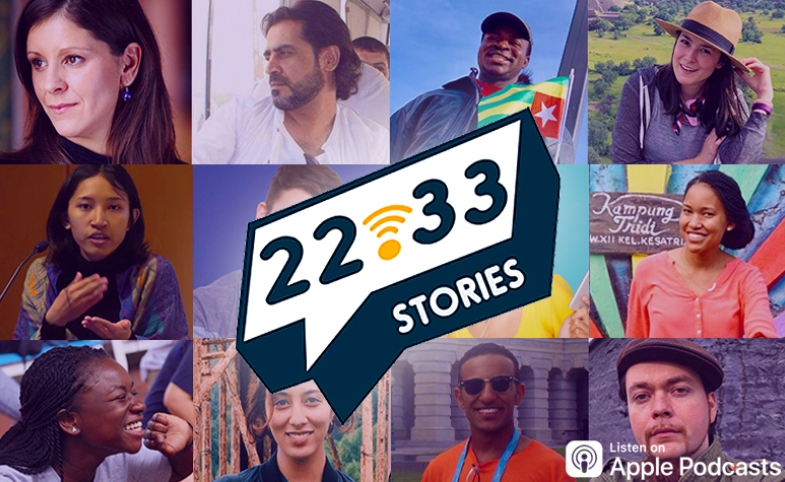A new video from the U.S. Department of State documents a recent trip to Pakistan by Marie Royce, Assistant Secretary at the Department's Bureau of Education and Cultural Affairs (ECA). Royce met with students, teachers,...
KEEP READINGThe CPD Blog is intended to stimulate dialog among scholars and practitioners from around the world in the public diplomacy sphere. The opinions represented here are the authors' own and do not necessarily reflect CPD's views. For blogger guidelines, click here.

22.33’s Life-Changing Stories of International Exchange
What does a blind soccer player from Brazil, an American cowboy transplanting new herds to Russia, a South African entrepreneur teaching kids to code through knitting, and an American rock musician playing traditional songs in Mongolia, all have in common? They are alumni of the U.S. Department of State's exchange programs, and they all share their life-changing stories on the Bureau of Educational and Cultural Affairs (ECA)’s new podcast, 22.33.
Inspired by the belief that international exchange programs are transformative, and that each person's experience is unique, 22.33 relies on first-person narrative storytelling. The podcast plays to listeners' curiosity and empathy while reflecting on the power of human connections to create mutual understanding between cultures. Each podcast episode features a unique guest who shares personal stories about life in a new country and the growth that occurred during their travels. Subtly, but powerfully, the podcast demonstrates the return on investment inherent from State Department exchange programs.
Exchanges are a powerful tool to promote American values and culture abroad. Through 70 years of Fulbright scholars, to Jazz Ambassadors breaking down symbolic walls during the Cold War, to the more recent Stevens Initiative virtual exchanges following the Benghazi attack, sharing ideas on a personal level creates empathy and understanding. No matter the political winds, societal shifts or technological innovations, exchanges continue to endure. Whether an alum traveled last month, last year, or three decades ago, if you ask them about a time on their exchange when they were deeply impacted, they will undoubtedly have a great story to tell.
So that is where 22.33 comes in. (The name 22.33 refers to Title 22, Chapter 33 of the U.S. Code—the law that created ECA.)
If there is a recurring theme throughout 22.33, it is the undeniable human need for belonging.
Developed and produced in-house by the Collaboratory, ECA's program design and innovation team, 22.33 uses storytelling methodology to create a different type of digital diplomacy tool; one aimed at the general public, with a goal that is decidedly different from that of a typical polished, if anodyne, USG product. Thus, the podcast puts people at the forefront—their challenges, proud moments, fears, epic fails, and once-in-a-lifetime moments.
If consistently, high-quality content is a common challenge for many podcasts, 22.33 does not need to worry—it is spoiled for material. The scope and diversity of ECA exchange programs mean a constant stream of inspired and inspiring participants and alumni, each with a new and different tale to tell.
To wit: An American National Women's Soccer League player travels to Botswana to find a 100-degree field and dozens of girls without shoes; an Arabic language teacher from Morocco finds herself despondently homesick in South Carolina, only to find relief after being caught in Hurricane Florence; an African American teacher lands in Kenya and finds himself always trying to convince people that, despite his American accent, he's not white; an American woman of Arab and Korean ancestry lands halfway across the world in Kyrgyzstan and, for the first time in her life, looks just like everyone else; a star opera soprano starts a choir with girls she met in a Mexico City back alley. The list goes on and on.
If there is a recurring theme throughout 22.33, it is the undeniable human need for belonging. Despite all the differences, challenges and culture shock one experiences while traveling abroad, each story moves beyond feeling foreign, language barriers or weird food, to focus on radical hospitality, deep curiosity and breaking down stereotypes. So whether or not the listener can relate to life in the Malaysian rainforest canopy or a Slovenian truffle hunt, they will find common ground and some appreciation about why international exchange is vital not only for the actual participants but for U.S. and foreign societies.
Aside from being enlightening, entertaining and educational, 22.33’s stories also provide a human voice to relevant policy issues, world events and news headlines. To commemorate World Environment Day, you can listen to how one Fulbright scholar turned a childhood obsession with bubble tea into a reporting tour to Taiwan to research waste management systems (while breakdancing on the side). Other published episodes have looked at issues such as disability rights, women's empowerment, human rights, volunteerism and democracy.
It's pretty simple: Everybody has a story. Whatever the subject—and one never knows what the next podcast episode will be about or where it will originate from; it could be from anywhere, about anything—the foundation that 22.33 builds upon is humanity.
New episodes are released every Friday, with frequent bonus episodes. You can listen and subscribe using any of the major podcasting platforms, including iTunes, Spotify and Stitcher. The website (eca.state.gov/22.33) features an audio player, transcripts, guest photos, musical credits, links to exchange programs applications and other bonus materials.
Visit CPD's Online Library
Explore CPD's vast online database featuring the latest books, articles, speeches and information on international organizations dedicated to public diplomacy.
POPULAR ARTICLES
-
January 29
-
January 20
-
December 17
-
January 28
-
January 2
Join the Conversation
Interested in contributing to the CPD Blog? We welcome your posts. Read our guidelines and find out how you can submit blogs and photo essays >.















